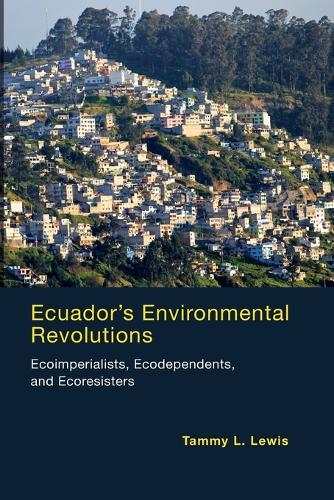
Ecuador's Environmental Revolutions: Ecoimperialists, Ecodependents, and Ecoresisters
(Paperback)
Publishing Details
Ecuador's Environmental Revolutions: Ecoimperialists, Ecodependents, and Ecoresisters
By (Author) Tammy L. Lewis
MIT Press Ltd
MIT Press
4th March 2016
United States
Classifications
Professional and Scholarly
Non Fiction
Political science and theory
333.709866
Physical Properties
Paperback
296
Width 152mm, Height 229mm, Spine 14mm
Description
An account of the movement for sustainable development in Ecuador through four eras- movement origins, neoliberal boom, neoliberal bust, and citizens' revolution.Ecuador is biologically diverse, petroleum rich, and economically poor. Its extraordinary biodiversity has attracted attention and funding from such transnational environmental organizations as Conservation International, the World Wildlife Fund, and the United States Agency for International Development. In Ecuador itself there are more than 200 environmental groups dedicated to sustainable development, and the country's 2008 constitution grants constitutional rights to nature. The current leftist government is committed both to lifting its people out of poverty and pursuing sustainable development, but petroleum extraction is Ecuador's leading source of revenue. While extraction generates economic growth, which supports the state's social welfare agenda, it also causes environmental destruction. Given these competing concerns, will Ecuador be able to achieve sustainability In this book, Tammy Lewis examines the movement for sustainable development in Ecuador through four eras- movement origins (1978 to 1987), neoliberal boom (1987 to 2000), neoliberal bust (2000 to 2006), and citizens' revolution (2006 to 2015). Lewis presents a typology of Ecuador's environmental organizations- ecoimperialists, transnational environmentalists from other countries; ecodependents, national groups that partner with transnational groups; and ecoresisters, home-grown environmentalists who reject the dominant development paradigm. She examines the interplay of transnational funding, the Ecuadorian environmental movement, and the state's environmental and development policies. Along the way, addressing literatures in environmental sociology, social movements, and development studies, she explores what configuration of forces-political, economic, and environmental-is most likely to lead to a sustainable balance between the social system and the ecosystem.
Reviews
Lewis' study is, perhaps, the first comprehensive history of modern environmentalism in Ecuador, and it provides an insightful analysis of the dynamics at play between international actors, national NGOs and movements, and the state. The book's analytical framework can be applied to other developing countries to analyse and understand the dynamics of struggles for sustainability in the Global South.
Journal of Latin American StudiesOverall, this book is a thoroughly researched contribution to understanding how global processes intermingle with environment and development trajectories on multiple levels throughout the developing world.
Bulletin of Latin American ResearchAuthor Bio
Tammy L. Lewis is Professor of Sociology at the City University of New York/Brooklyn College and Professor at the CUNY Graduate Center in Sociology and Earth and Environmental Sciences.
